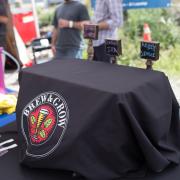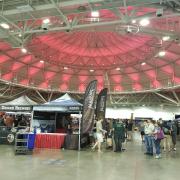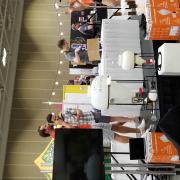hi to all.i want to ask what do you guys do regarding chicago tap water.
i know the club has a water filter,but don't know which one.maybe someone that brews in the club can tell me.i'm thinking of geting a water filter,cos i think a have a problem with chlorine and chloramine.i'm not sure but i believe the city uses both.i also think that this is the main cause for my beer to have medicinal,band aid taste.i might be wrong.i have always used campden tablets and i think that for some reason they are not good enough for my process.i have recently started with all grain brewing and i understand that i have to watch my Ph and RA.i have paid attention to my ferm temps and sanitation,so the water is the only thing left that can cause this problem.
having all this in mind what do you think will be the best solution,the best filter.RO filter or somethign else.
thank in advance.
darko











Hi Darko,
James will be among the best to answer this question, as he has good experience with modifying water chemistry. However, I will just give you my experience: I have not had problems with Chicago tap water, whether brewing at home or at the brewhouse, so it may still be something in your process. Do you brew at home or at the brewhouse? How do you monitor temperature during fermentation, especially during the first 48 hours of fermentation? Are you pitching an appropriate amount of healthy yeast?
EDIT: I see that you brew at home. Maybe there's something funky in your pipes? Does your water taste like chlorine when it comes out of the faucet? Also, you could try using exclusively RO water (buy a couple of 5 gallon jugs from the grocery store) for a batch to see if that helps with the band aid flavor.
-Adam
thanks Adam.i know there are a lot of thing that can affect the procces,but so far i have monitored my fermentation temperature and used MrMalty for yeast quanity.i belive chicago tap water has a lot of chlorine and maybe chloramine,so that is a problem for sure.
it's a good idea to try brewing with RO water from the store and see the difference.
From what I read on HBT, Chicago water is pretty good, particularly if you run it through a charcoal filter to reduce the amount of chlorine in it. I am not sure whether it has been confirmed if Chicago's water has chloramine in it, and you've used campden, so I doubt that it does.
As I've said, I've only ever used tap water and never had a particularly noticable problem with my beer, but perhaps you're especially sensitive to certain compounds that are derived from chlorine, and I'm not.
-Adam
Its probably not the water, its likely in your process somewhere. Brewing is complex, but here is a list in order of importance of things that could create phenols (medicinal band aid taste)
- Bacteria or wild yeast. This is the typical culprit. Meticulous sanitation with starsan or iodophor is required. never use bleach. Bleach will not kill yeast or spores, bleach can also cause phenolic like of flavors if not properly rinsed out.
-Phenols come from grain husks. If you over crush your grain or over sparge your mash, or if you let the mash ph get too high you will extract them. Batch sparging is a little more fool proof method than fly sparging in that it creates a constant ph and it is harder to over sparge. Its still possible though. Also, try not to shoot for much more than a 70% efficiency. The higher your efficiency the more likely you are in extracting phenols and tannins (tannins cause astringency) Finally adjusting your water chemistry with brewing salts will get your ph to an acceptable level. This is complicated and I cant describe it here. We will be doing a through analysis in the BJCP classes. Also you should listen to these podcasts to learn it.
http://thebrewingnetwork.com/shows/497
http://thebrewingnetwork.com/shows/500
http://thebrewingnetwork.com/shows/508
http://thebrewingnetwork.com/shows/513
and the lite version:
https://www.youtube.com/watch?v=zJj__jEkFUE
- Chlorinated water and sanitizer residue (typically from using chlorine as a sanitizer) can cause phenols. Campden tablets should take care of it. Prep your water the night before for the most effect. Charcoal filtered water is definitely better, but you will also be stripping some minerals you want out of the water. So I would not do this until you have a good handle on water modification.
- your boil might not be vigorous enough. the boil coagulates polyphenols. Your chilling might not be fast enough, chilling quickly coagulates polyphenols
- finally, it could be a yeast or feremtation problem, but it sounds like you have a good handle on that. Just make sure to always make a starter 18 hours before, shake as much as you can or use a stir plate. Aerate your wort prior to pitching. Maintain a constant temp in fermentation. Maintaining a temperature is more important than hitting a exact temperature and is what a temperature controller and an heating/cooling source is so key.
James thank you for writing such a good and long explanation.i have listened to the podcasts and also watch the video.it seems there are a lot of things to learn.i'll try thing from the list and hopefuly i'll figure out what is the problem.
thank you again.